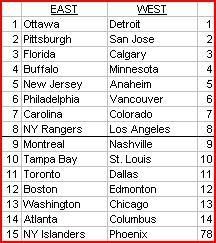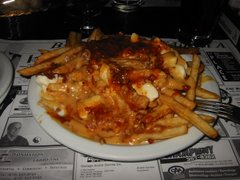(To be published in the upcoming SportsGrumblings.com free preseason fantasy guide. My assignment was the Northeast division...)
================================
Buffalo Sabres
2006-07 record: 53-22-7, 113 points. First in division/first in conference. Lost in Conference Finals to Ottawa Senators.
Coach: Lindy Ruff
General Manager: Darcy Regier
Home arena: HSBC Arena
Capacity: 18690
Fresh off a heartbreaking and unlucky game 7 loss to Carolina in the Conference Finals, the 2006-07 Buffalo Sabres re-tooled slightly and started the season on a tear – winning their first ten games en route to the best record in the league and their first Presidents Trophy. Leading the league in goals scored and boasting four 30+ goal scorers, plus four more with at least 19, the team was a roaring success both on and off the ice. Buffalo fans bought every seat all year and the entire region was poised for their first major championship since the 1965 Buffalo Bills won the AFL title. Alas, a funny thing happened on the way to the Stanley Cup – teams were ready for them, and gave them a battle in nearly every game until the Sabres ran out of gas. The New York Islanders were no match on paper but fought a valiant five game series that hardly made Sabres’ fans confident. The New York Rangers earned a split after four games and perhaps only a miraculous game five comeback by Buffalo catapulted them into the next round against the red-hot Ottawa Senators. There, they met their doom, much of it on their own hands – with a dreadful power-play that drew calls from the hometown faithful to “decline the penalty” after a few games. The almost-dream season ended in overtime of game five, but after a few stunned days fans had every right to look ahead to the inevitable Cup…
…and then Sabres’ fans worst fears came true: both captains were lost on July 1st to free agency - “Black Sunday” as it came to be known. Daniel Briere signed with the Philadelphia Flyers and Chris Drury with the New York Rangers, arguably two of the most-hated Sabres’ rivals. To top it off, the Edmonton Oilers gave restricted free agent Thomas Vanek (43 goals) a monstrous offer sheet that the Sabres absolutely had to match.
So is the Buffalo Sabres’ time over? Have they squandered a golden opportunity to bring the Stanley Cup home to a hockey-mad area? Or will the organization’s long-term scouting vision pay off once again and simply plug new talent into the available slots?
Forwards:
Depth Chart:
| Thomas Vanek | Derek Roy | Maxim Afinogenov |
| Ales Kotalik | Tim Connolly | Jason Pominville |
| Jochen Hecht | Paul Gaustad | Drew Stafford |
| Dan Paille | Adam Mair |
|
| Andrew Peters | Mike Ryan |
|
rookies/callups: C – Marek Zagrapan, W - Clarke MacArthur, Patrick Kaleta, Mark Mancari.
So here are the facts: a team loses two of their top three scorers, one a 95 point sniper and the other with 17 powerplay goals and an intangible legend of supposed unparalleled leadership; furthermore, the two players were arguably the two most popular in the community. Combined with the Vanek offer sheet, and everything adds up to an early summer public relations nightmare, and the end of the Sabres’ window to win the Stanley Cup. Or is it?
Of course losing two of your top three scorers will be damaging to any team, at least in the short-term. However, that fact doesn’t mean those points won’t come at all. Those roles will now be filled by younger (and much cheaper) players, and as anyone who has paid attention to the NHL over the past two seasons, the Sabres have had no shortage of replacement parts. Injury callups such as
Jason Pominville,
Derek Roy, and
Drew Stafford have gone from temporary replacements to bonafide NHL regulars.
The Sabres’ feature line this year will no doubt be the “RAV” line of Roy centering Vanek and the ever-exciting
Maxim Afinogenov. With the huge long-term contracts just signed by Roy and Vanek, the Sabres have locked each of them up for at least six years and through their prime years, until each is 30. Derek Roy’s 63 points last year with roughly little powerplay time should increase this season as he becomes the team’s de facto number one center. Wildly talented and exciting
Tim Connolly hopes to build upon the success he had two years ago before a devastating concussion left him on the sidelines for a year. If he stays healthy, he should provide an outstanding second center for Buffalo, and could look to any number of talents on his wings to find the net. Jason Pominville took over for the departed
J.P. Dumont last year and ended up with 34 goals, 30 of which were at even-strength – one behind league leader
Vincent Lecavalier. Pominville is a natural scorer and coupling him with Connolly should be a treat to watch. Drew Stafford is the next most-exciting talent on the team; a frequent call-up from the nearby Rochester AHL affiliate, Stafford managed 13 goals in just half a season while earning respect from teammates and fans alike for a strong physical presence and defence of teammates (recall the Drury/
Chris Neil incident in February). With more minutes, special teams play, and a regular centerman Stafford should easily reach mid-20s in goals and has 30 goal / 65 point power winger potential for the foreseeable future.
The Sabres’ forward depth is obviously a bit less this season but still well above average -
Ales Kotalik is an enigma; a 227 pound winger with a devastating shot with inconsistent results. Buffalo would be very happy to get 20 goals / 50 points and a nightly physical presence, but his $2.5 million salary makes him one of the most likely to be dealt.
Jochen Hecht is an underrated and versatile winger who’s value doesn’t necessarily show on the scoresheet – he gives an effort every night and often does the unseen work away from the puck leading to chances for his linemates. Beyond that the Sabres look to put forth a more physical presence this season, with
Paul Gaustad to step up and take a stronger role as third center.
Dan Paille and
Adam Mair will be the most prominent to fill out the remaining spots. Buffalo may not lead the league in goals again this season but they should fall comfortably within the top 10.
Defence:
Depth Chart:
| Henrik Tallinder | Toni Lydman |
| Brian Campbell | Teppo Numminen |
| Dmitri Kalinin | Jaroslav Spacek |
| Nathan Paetsch |
|
rookies/callups: Michael Funk, Andrej Sekera, Mke Card.
Buffalo’s defensive corps may not have any of the bigger names in the NHL but due to their vast exposure in the past few seasons are starting to get some serious name recognition. The unquestioned top duo of
Henrik Tallinder and
Toni Lydman won’t bring much offence (33 points combined in 114 games) but the team suffers greatly without them in the lineup. Their simple defensive style of getting the puck to their forwards is essential to the quick transition game of the Sabres. Taking care of the offensive side is
Brian Campbell, starting just his second full season in the NHL. Campbell, with 48 points last season, was an All-Star game starter after a fantastic first half, but struggled in the latter half of the season as he appeared to lose confidence in his greatest skill – moving the puck up the ice. He brings a flair to the Buffalo blueline not seen since the
Phil Housley days but like Housley he can be careless about his defensive game. Back for yet another “final” season will be ageless
Teppo Numminen; slowing a bit but still an above-average rearguard due to his low panic threshold with the puck. The biggest frustration for the Sabres and their fans may be
Dmitri Kalinin, a one-time first round pick who has shown flashes of all-around brilliance but suffers from a glaring and shocking lack of confidence, occasionally forcing the coaching’s staff’s hand in benching him. Also in that vein was last year’s newcomer
Jaroslav Spacek – acquired in free agency, the offensive-minded defenseman slowly lost coach
Lindy Ruff’s confidence and by the end of the playoffs was only on the ice for a handful of minutes per night. Skilled utility man
Nathan Paetsch slots in comfortably as either a replacement defenseman or fourth-line winger. Buffalo signed him to a three-year deal in late July, and clearly sees him as a future contributor.
Buffalo’s all-around defensive game is solid but at times they can maddeningly get pinned in their own end. Much of this problem results in the forwards forgetting their defensive responsibilities, leaving the defenceman along among a fierce forecheck. Ottawa exploited this team weakness in the playoffs last season and Buffalo must either think more conservatively overall (read: not always playing for the odd-man breakout) or upgrade the back end of their defensive corps.
Goaltending:
Ryan Miller
Jocelyn Thibault
Very simply, despite all of Buffalo’s offensive exploits, no player means more to Buffalo’s success than goaltender
Ryan Miller. In many ways he’s a goalie that cannot be measured by his statistics (see also
Grant Fuhr, 1984-1988) because on this aggressive offensively-minded team he will likely see more quality rubber flying his way than in a conservative system. Miller differs from many of the great goaltenders of the past and present in that he doesn’t need to make the spectacular save very often; his positioning is exceptional and he reads the oncoming rush as well as anyone in the league. As a result of Miller’s skills, the Sabres are able to press more and take chances they otherwise would not with a lesser goalie between the pipes. Having said that, and in light of the high profile free agent losses this year, it would behoove management to lock Miller up to a long-term deal very soon (he has two seasons left before he becomes an unrestricted free agent). Veteran
Jocelyn Thibault was signed to a one year deal and should see roughly 15-20 games of action this season, but should not be counted on to carry the team in the event of any long-term absence of Ryan Miller.
Outlook:
Now that a little time has passed since Briere and Drury’s departure, people can analyze what the Buffalo Sabres actually are, rather than what they could have been. And what they are is still an elite team; perhaps in the overall picture they took a step back but their core is now even younger, and in the long run they should experience sustained success. They should be able to give Ottawa a run for the division, even though it may take some time for new line combinations to jell, and be one of the better teams in the Eastern Conference once again.





